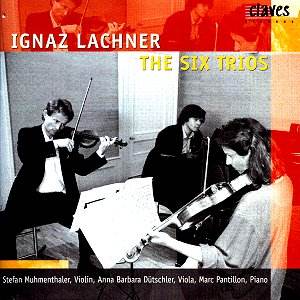Ignaz Lachner was the son of Theodor Lachner (1798-1877).
His brothers were Franz (1803-1890) and Vincenz (1811-1893). Franz
was the most famous of the sons, much associated with Munich,
a composer of abundant energy. There are eight symphonies and
extensive songs and chamber music with oratorios, operas (including
Benvenuto Cellini, 1849) and church music. Ignaz was also
active in Vienna, Hamburg, Stockholm and Frankfurt. He vied with
his brother in productivity chalking up three operas including
Loreley produced in Munich in 1846.
On the evidence of these six four-movement trios
Ignaz was a fluent melodist without the invincible logic of a
master of sonata-form. Op. 89 is Beethovenian - a leaf taken from
the book of the Spring Sonata. The bubbling cassation of
an andantino suggests Scott Joplin. The finale is Mozartian:
mercurial, quick-witted. The Op. 37 also recalls Beethoven. It
is perhaps an indication of the early opus number that both the
andante and the thrawn vigour of the scherzo outstay
their welcome. Fortunes are restored by the Op. 102 work which
sidles and smiles enchantingly. Op. 58 has an affable flow and
the same playful dialogue to be found in Beethoven's Archduke
Trio. Lachner cuts a Tchaikovskian dash in the scherzo and
injects some fizzing energy in the finale. The Op. 103 feints
towards earnest Olympian heights of the Beethoven violin concerto
although this is contrasted incidents in which a slightly hysterical
joyousness bubbles up. The Op. 45 work is the longest of the lot
at more than 33 minutes. Its skirling and rough piping is quite
distinctive. The glitter of Haydn and a playfulness laced with
tragedy suffuses this work. Listening to all these trios I thought
of most often of the affable Beethoven triple concerto, much slighted,
but a work for which I have great affection.
This music is hardly ever dull but this is a
composer who holds on to his good ideas for a little longer than
they can sustain.
Please note that these are not the conventionally
specified piano trio. Lachner here substitutes a viola for the
more normal cello.
Six unknown piano trios: charmers every one.
Superbly documented by Claves. Lovingly played by Muhmenthaler,
Dütschler and Pantillon.
Rob Barnett
